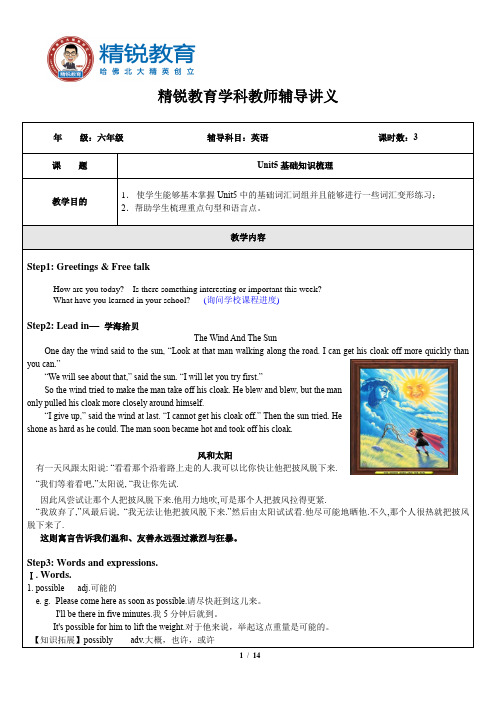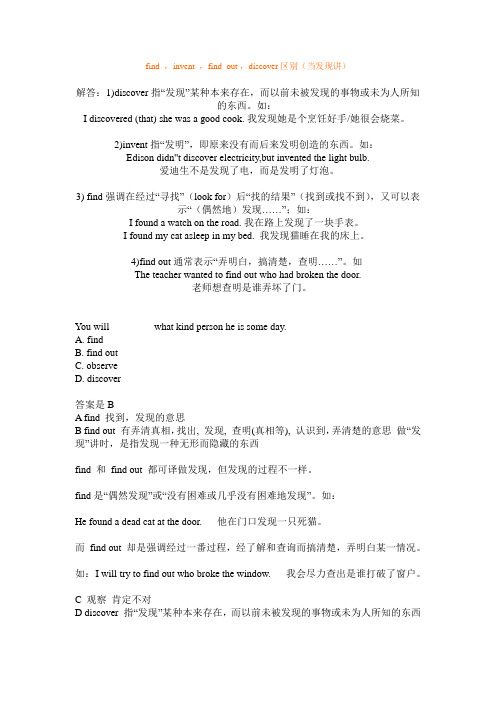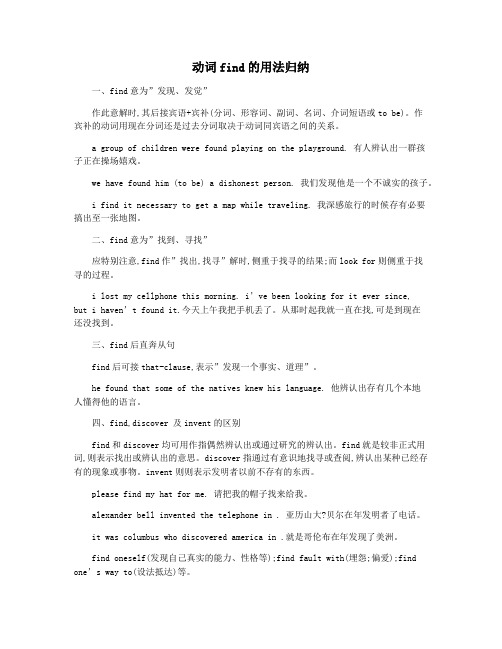find,find out,look for与discover 区别与练习
沪教牛津版六年级英语下(Unit5 基础知识梳理)

精锐教育学科教师辅导讲义年级:六年级辅导科目:英语课时数:3课题Unit5基础知识梳理教学目的1.使学生能够基本掌握Unit5中的基础词汇词组并且能够进行一些词汇变形练习;2.帮助学生梳理重点句型和语言点。
教学内容Step1: Greetings & Free talkHow are you today? Is there something interesting or important this week?What have you learned in your school? (询问学校课程进度)Step2: Lead in—学海拾贝The Wind And The SunOne day the wind said to the sun, “Look at that man walking along the road. I can get his cloak off more quickly than you can.”“We will see about that,” said the sun. “I will let you try first.”So the wind tried to make the man take off his cloak. He blew and blew, but the manonly pulled his cloak more closely around himself.“I give up,” said the wind at last. “I cannot get his cloak off.” Then the sun tried. Heshone as hard as he could. The man soon became hot and took off his cloak.风和太阳有一天风跟太阳说: “看看那个沿着路上走的人.我可以比你快让他把披风脱下来.“我们等着看吧,”太阳说, “我让你先试.因此风尝试让那个人把披风脱下来.他用力地吹,可是那个人把披风拉得更紧.“我放弃了,”风最后说, “我无法让他把披风脱下来.”然后由太阳试试看.他尽可能地晒他.不久,那个人很热就把披风脱下来了.这则寓言告诉我们温和、友善永远强过激烈与狂暴。
find_find_out_discover等的区别

find ,invent ,find out ,discover有什麽区别(当发现讲)find强调找的结果(找到或没找到),I could not find my watch anywherelook for 强调找的过程(不知能不能找到),I has looked for my watch for a dayfind out指查明事实的真相,I found out that he was a thief discover指发现本来就存在去一直没被发现的东西,哥伦布发现新大陆就用discover另外,invent也常在一起辨析,指发明原先没有的东西解答:1)discover指“发现”某种本来存在,而以前未被发现的事物或未为人所知的东西。
如:discover意为“发现”,表示“偶然”或“经过努力”发现客观存在的事物、真理或错误,即指发现原来客观存在但不为人所知的事物,也可表示发现已为人所知的事物的新的性质或用途。
Columbus discovered America in1492.哥伦布1492年发现了美洲。
We soon discovered the truth.我们很快就弄清了真相。
I discovered (that) she was a good cook. 我发现她是个烹饪好手/她很会烧菜。
2)invent指“发明”,即原来没有而后来发明创造的东西。
如: Edison didn''t discover electricity,but invented the light bulb. 爱迪生不是发现了电,而是发明了灯泡。
3) find强调在经过“寻找”(look for)后“找的结果”(找到或找不到),又可以表示“(偶然地)发现……”;如:I found a watch on the road. 我在路上发现了一块手表。
find意为“找到、发现”,指找到或发现自己所需要的东西或丢失的东西,着重指找到的结果。
find,find out,discover等的区别

find ,invent ,find out ,discover有什麽区别(当发现讲)解答:1)discover指“发现”某种本来存在,而以前未被发现的事物或未为人所知的东西。
如:I discovered (that) she was a good cook. 我发现她是个烹饪好手/她很会烧菜。
2)invent指“发明”,即原来没有而后来发明创造的东西。
如:Edison didn''t discover electricity,but invented the light bulb.爱迪生不是发现了电,而是发明了灯泡。
3) find强调在经过“寻找”(look for)后“找的结果”(找到或找不到),又可以表示“(偶然地)发现……”;如:I found a watch on the road. 我在路上发现了一块手表。
I found my cat asleep in my bed. 我发现猫睡在我的床上。
4)find out 通常表示“弄明白,搞清楚,查明……”。
如The teacher wanted to find out who had broken the door.老师想查明是谁弄坏了门。
You will ________ what kind person he is some day.A. findB. find outC. observeD. discover答案是BA find 找到,发现的意思B find out 有弄清真相,找出, 发现, 查明(真相等), 认识到,弄清楚的意思做“发现”讲时,是指发现一种无形而隐藏的东西find 和find out 都可译做发现,但发现的过程不一样。
find是“偶然发现”或“没有困难或几乎没有困难地发现”。
如:He found a dead cat at the door. 他在门口发现一只死猫。
而find out 却是强调经过一番过程,经了解和查询而搞清楚,弄明白某一情况。
“寻找”英文词汇之间的差别

21世纪英汉汉英双向词典look for1.try to find;seek;search for寻找;寻求*He is looking for a job.他在找工作。
*We are looking for an ambitious young assistant.我们正在找一名有雄心壮志的青年助手。
2.expect期待*Bob wouldn't go for a ride with other boys because he was looking for a phone call from Julie.鲍勃不肯与其他男孩一起去兜风,因为他在等朱丽的电话。
*It's clear that the result of the experiment was better than we had been looking for.很明显,试验的结果要比我们预料的好。
*We didn't look for such a success.这样的成功是我们没想到的。
*Don't look for any help from him.别期待他会帮助你。
3.do things that cause(one's own trouble)自找(麻烦)*Joe often gets into fights because he is always looking for trouble.乔常跟人家打架,因为他总是惹麻烦。
*If you say the opposite of everything that others say,you are looking for a quarrel.假若你跟人家唱反调,你就是在自找麻烦。
牛津高阶英汉双解词典find 1/ faɪnd; faɪnd/ v (pt, pp found / faund; faʊnd/)[Tn, Tn.pr, Tn.p, Cn.a] discover (sth/sb) unexpectedly or by chance; come across 意外或偶然发现(某事物[某人]); 遇到; 碰到: Look what I've found.看我发现了什麽. * I found a 5 note on the pavement. 我在人行道上捡到了一张5英镑的纸币. * He woke up and found himself in hospital. 他醒来发觉自己在医院里. * I was disappointed to find you out (ie that you were out) when I called. 我给你打电话时知道你不在, 十分失望. * We came home and found her asleep on the sofa. 我们回到家, 看到她在沙发上睡着了.[Tn, Tn.pr, Dn.n, Dn.pr] ~ sth/sb (for sb) discover sth/sb by searching, inquiry or effort (经寻找、询问或努力)发现某事物[某人]: After months of drilling, oil was found off the coast. 经数月钻探, 在沿海找到了石油. * find a cure for cancer 找到治疗癌症的方法* find an answer to a question 找到问题的答案* I can find nothing new to say on this subject. 对这个问题, 我提不出什麽新看法. * Can you find me a hotel/find a hotel for me? 你能给我找一家旅馆吗? [Tn, Dn.n, Dn.pr] ~ sth/sb (for sb) obtain or get back (esp sth/sb that was lost) 得到或找回(尤指丢失的某物[某人]): Did you find the pen you lost? 你丢的笔找到了吗? * The missing child has not been found yet. 失踪的孩子仍未找到. * I'll help you find your shoes/find your shoes for you. 我来帮你找鞋.[Tn] succeed in obtaining (sth); provide or supply 得到(某事物); 提供; 供给: I keep meaning to write, but never seem to find (the) time. 我一直想写, 但似乎总是找不到时间. * Who will find the money to pay for this trip? 谁来筹措旅费?[Tf, Cn.a] discover (sth/sb) by experience (to be or do sth); become aware of (凭经验)发现(某事物[某人])(为某事物或做某事物); 了解到: I find (that) it pays to be honest. 我认识到为人诚实终受益. * How do you find your new job? 你认为你的新工作怎麽样? * She found it difficult to understandhim/found him difficult to understand. 她觉得很难理解他. * We found the beds very comfortable. 我们觉得这些床很舒服. * We found him (to be) dishonest. 我们认为他不诚实.[Tn] arrive at (sth) naturally; reach (自然而然)达到; 到达: Water will always find its own level. 水总会自行流平. * The arrow found its mark. 箭射中了目标.[Tn] (used in a statement of fact, indicating that sth exists 用於对事实的陈述, 说明某事物的存在): You'll find (ie There is) a teapot in the cupboard. 碗橱里有个茶壶. * These flowers are found (ie exist, grow) only in Africa. 只有在非洲才有这类花.[Cn.a] (law 律) decide and declare as a verdict 断定; 裁决; 宣判: How do you find the accused? 你如何裁决被告? * The jury found him guilty (of manslaughter). 陪审团裁定他(误杀)罪名成立.(idm 习语) all `found (of wages) with free food and lodging included (指工资)附带免费食宿. be found wanting be shown to be not sufficiently reliable or capable of undertaking a task, etc 表现出不够可靠或能力不够. find fault (with sb/sth) look for and discover mistakes (in sb/sth); complain (about sb/sth) 找(某人[某事物] 的)错; 埋怨(某人[某事物]): I have no fault to find with your work. 我对你的工作没有说的. * She's always finding fault (with me). 她总是找(我的)茬儿. find/lose favour with sb/in sb's eyes => favour1. find one's `feet (a) become able to stand, walk, etc steadily 能够站稳、走稳等: After a six-week illness it took me some time to find my feet again. 我病了六个星期, 痊愈后很长时间才能站稳. (b) become able to act independently and confidently 能够独立而有信心地行动: I only recently joined the firm so I'm still finding my feet. 我最近才加入这家公司, 因此还在摸索着干. (not) find it in one'sheart/oneself to do sth (usu with can/could 通常与can/could连用) (not) be able to do sth because of kindness or consideration 由於善意或体谅而(不)能做某事物: I cannot find it in myself to condemn a mother who steals for a hungry child. 我不忍心责备为饥儿行窃的女人. * Can you find it in your heart to apologize? 你有诚意道歉吗? `find oneself discover one's true abilities, character and desires 发现自己真实的能力、性格和愿望: At twenty-two, he's just beginning to find himself. 他在二十二岁时才逐渐发现自己的实际才能. find/meet one's match => match2. find one's own level find and associate with the people with whom one is morally, socially or intellectually equal 找到并结交道德观念、社会地位或知识层次与自己相当的人. find/lose one's`voice/`tongue be able/unable to speak or express one's opinion 能够[不能够]说出或表达自己的意见: Tell me what you think or have you lost your tongue? 告诉我你的想法--是否你有口难言? find its wayto... reach a destinationnaturally 自然达到目的地: Rivers find their way to the sea. 江河径自流入海洋. find one's way (to...) discover the right route (to a place) 发现(到某处的)途径: I hope you can find your way home. 我希望你能找到回家的路. * She couldn't find her way out of the building. 她找不到走出大楼的路. take sb as one `finds him accept sb as he is without expecting him to behave in a special way 认为某人就是如此, 并不期望他有其他表现: We've only just returned from holiday so you must take us as you find us. 我们刚刚度假回来, 所以你看我们就是这副样子.(phr v) find (sth) out learn (sth) by study or inquiry (经研究或询问)获知(某事物): Can you find out what time the train leaves? 你能查问出火车什麽时候开吗? find sb out discover sb who has done wrong, lied, etc 发现某人做错事、说谎等: He had been cheating the taxman but it was years before he was found out. 他一直欺骗税务局, 但多年之后才被查出. find for/against sb (law 律) give a verdict in favour of/against sb 做出对某人有利[不利]的裁决: The jury found for the defendant. 陪审团做了有利於被告的裁决.> finder n1 person who finds sth 找到某物的人: Lost: one diamond ring. Finder will be rewarded. 寻物: 遗失钻戒一枚, 寻得者将获重酬.2 small telescope attached to a larger one used for locating an object for observation 寻星镜(附加在大望远镜上便於寻找观察目标的小望远镜).3 (idm 习语) ,finders `keepers (saying 谚) whoever finds sth has the right to keep it 谁找到归谁.finding n (usu pl 通常作复数) 1 thing that is discovered as the result of an (official) inquiry (官方的)调查结果: the findings of the Commission 调查团的调查结果* The report's main finding is that pensions are inadequate. 报告的主要内容是退休金不敷应用. 2 (law 律) decision or verdict of a court or jury 法庭或陪审团的判决或裁决. find 2/ faɪnd; faɪnd/ nthing or person that is found, esp sth/sb valuable or pleasing 发现或找到的物或人(尤指有用的): Our new gardener was a marvellous find. 我们找到了一个很出色的花匠.act of finding sth/sb 发现; 找到: an important archaeological find 重要的考古发现* I made a great find in that second-hand bookshop yesterday. 我昨天在旧书店找到一本很宝贵的书. 金蝶软件-企业管理软件专家!中国程序员技术问答社区21世纪英汉汉英双向词典findfind[faInd; faind](found[fand; faund])及物动词1 (努力) 找出a. (寻找而) 找到<人、东西>; 寻获<遗失的东西等>~ the right man for a job寻找某项工作的适当人选Have you found your car key?.你找到车子的锁匙了吗?The dog was nowhere to be found.到处都找不到那条狗b. 把<东西、人>找出给<某人>; 把<东西、人>找出[给某人][for] Will you ~ me my tennis racket?.请你把我的网球拍找出来好吗?Please ~ her what she wants.请把她所要的东西找出来给她c. 发现<人、东西><在做…>We found the missing girl wandering about the woods.我们发现那个失踪的女孩在森林中徘徊d. [~ one's way] (辛苦地) 前进,抵达,到达~ one's way home alone独自一个人抵达家门We found our way to the lake.我们到达湖边2 (研究、调查、计算等而) 发现a. 找出<答案>~ the answer to a problem找出问题的答案F~ the cube root of 71.求71 的立方根b. 查明,想出…I must ~ when the next bus starts.我必须查一查下一班公共汽车什么时候开Please ~ how to do it.请想一想如何做那件事c. 查出,发现<…事>The doctor found that she had cancer in her throat.医师发现她有喉癌3 (偶然) 发现a. (无意中) 发现…; 拾得; 碰见…~ a coin in a field (偶然) 在田野间发现[拾得] 一枚硬币~ a mistake in the book发现书中一点错误They left everything as they found it.他们使一切东西都保持发现时的原状(不去动它们)b. 发现… <处于某种情况>She found her baby still asleep.她发现婴儿还在睡The soldier was found dead in the woods.那名士兵被发现死在森林中c. 发现…<在做…>I found him lying on the bed.我发现他躺在床上d. 发现…<被…>He found a dog abondoned in the wood.他发现有一条狗被弃于林中e.(文语) <年、月、日等> (在…) 找到<某人等>Two days later found me at Rome.两天后我到了罗马Morning found him still in bed. (.到了) 早上他还在睡4 (由经验等) 得知a. [在…]找到[认出] <…的存在> ; [在…]经验到<喜悦、困难等> [in] I found no sense in what he said.我认为他说的话没什么道理He found no difficulty in solving the problem.他觉得解决该问题并无困难Columbus found a warm supporter in the Queen.哥伦布发现王后是位热心的支持者b. 认为…<是…>; 知道,发觉,觉得They found his claim reasonable.他们认为他的要求是合理的We found it difficult [easy] to do so.我们觉得那样做是困难的[容易的]They found the place deserted.他们发现那个地方人烟绝迹I called at her house but found her out.我拜访她的家但发现她不在She was found to be dishonest.她被认为不诚实c. 发觉<某事物> <…>He found the chest to contain silver coins.他发现那口箱子里装著银币d. 知道,发觉<…事>I found that I was sinking in the mud.我发觉自己在泥淖中正往下沉I ~ (that) it pays.我发觉它划得来[合算]I'm sorry, I ~ that I can't help you.很抱歉,我发觉自己无法帮助你5[~ oneself]a. 发现<自己> <在…状态[场所] > ; 发觉<…情形>~ oneself alone发觉自己是独自一人~ oneself in a dilemma发觉自己进退[左右]为难After walking two or three hours they found themselves in a small village.走了两三个小时后,他们来到一个小村庄How do you ~ yourself today (.你今天觉得怎样)b. 发觉<自己><在做…>I found myself lying in my bedroom.我发觉自己躺在卧室里c. 发现<自己> <有做…的能力> ,发现<自己> <适合做…> ,适得其所At last he found himself as a cook.最后他发现自己适合做厨师d. 自理[衣食住等] [in]20 a day and ~ yourself (inclothes)日薪二十英镑,膳宿自理(服装费自理)6 (在…) 可找到…, (知道) (在…) 有…,存在…Lions are found in Africa.非洲有狮子You ~ this plant everywhere in Japan.你在日本可看到各地都有这种植物7a. (设法) 取得<必需品> ; 找出<时间、金钱等>; 鼓起<勇气等>~ the capital for a new business找到开创新事业的资金~ (the) time [courage] to do it找出时间[鼓起勇气] 做那件事b. 获得<想要的东西> ; 拥有→ find FAVOR with a personThe idea found general acceptance.那种想法被普遍接受The new product will ~ a lot of buyers.那个新产品会找到很多买主c. 获得[恢复] <器官> 的功能,变成可使用…~ one's feet→ foot 成语(2)→ find one's TONGUEThe young bird found its wings.小鸟学会使用双翼[会飞了]8<东西>到达; 打中<目标等> ; 流到The arrow。
外研英语八年级上Module6重要词句讲解 习题 有答案

八上Module 6 Animals in danger 一、课内基础必背词汇1、snake [sneik] n. 蛇2、neck [nek] n. 脖子;脖子3、thin [θin] adj. 细长的;瘦的4、danger [’deindʒə] n. 危险;危害5、symbol [’simbəl] n. 象征;标志6、feed [fi:d] vt. (fed [fed])喂养;饲养7、interested [’intristid] adj. 关心的,感兴趣的8、allow [ə’lau] vt. 允许;准许9、develop [di’veləp] v. 研制;制定10、protect [prəu’tekt] vt. 保护,防卫11、wild [waild] adj. 野生的;n.野生环境12、grow [grəu] v. grew [ɡru:] (逐渐)变得;生长13、nature park 自然公园14、enough [i’nʌf] adj. 充分的;足够的15、peace [pi:s] n. 和平;太平16、nature [’neitʃə] n. 大自然;自然界17、notice [’nəutis] n. 告示,布告18、set [set] v.设置;设定19、raise [reiz] vt. 抚养;筹集(钱款);养育;20、research [ri’sə:tʃ] n. 研究;探讨21、baby [’beibi] n. 婴儿,婴孩22、situation [sitju’eiʃən] n. 情况;形势23、scientist [’saiəntist] n. 科学家24、produce [prə’dju:s] vt. 生育;繁殖25、southwest [,sauθ’west] n. 西南adj. 西南的;朝西南的26、government [‘ɡʌvənmənt] n. 政府必背短语in danger 处于危险中at last 终于;最后think of 想到;想出take away 夺走;拿走in peace和平地;平静地look after 照顾、照料in order to 为了set up开办;设立;创办;建立重点句型1. We need to protect them better.我们需要更好地保护他们。
find_find_out_discover等区别

find ,invent ,find out ,discover区别(当发现讲)解答:1)discover指“发现”某种本来存在,而以前未被发现的事物或未为人所知的东西。
如:I discovered (that) she was a good cook. 我发现她是个烹饪好手/她很会烧菜。
2)invent指“发明”,即原来没有而后来发明创造的东西。
如:Edison didn''t discover electricity,but invented the light bulb.爱迪生不是发现了电,而是发明了灯泡。
3) find强调在经过“寻找”(look for)后“找的结果”(找到或找不到),又可以表示“(偶然地)发现……”;如:I found a watch on the road. 我在路上发现了一块手表。
I found my cat asleep in my bed. 我发现猫睡在我的床上。
4)find out 通常表示“弄明白,搞清楚,查明……”。
如The teacher wanted to find out who had broken the door.老师想查明是谁弄坏了门。
You will ________ what kind person he is some day.A. findB. find outC. observeD. discover答案是BA find 找到,发现的意思B find out 有弄清真相,找出, 发现, 查明(真相等), 认识到,弄清楚的意思做“发现”讲时,是指发现一种无形而隐藏的东西find 和find out 都可译做发现,但发现的过程不一样。
find是“偶然发现”或“没有困难或几乎没有困难地发现”。
如:He found a dead cat at the door. 他在门口发现一只死猫。
而find out 却是强调经过一番过程,经了解和查询而搞清楚,弄明白某一情况。
中考英语基础知识复习检测8(八年级)(units 4—6)

中考基础知识梳理,贵阳五年中考真题演练◆词汇类()1.(2013贵阳37题)Jimmy is a good boy.He ________ his father.They are both kind and clever.A.takes after B.takes out C.takes away2.(2014贵阳90题)Lots of people surf the Internet to look for some ________ about the missing plane.(information)3.(2014贵阳93题)“Please ________,boys and girls,class begins.”Our teacher Miss Green said in a soft voice.(quiet)◆形容词比较等级4.(2013贵阳94题)—Which do you like ________,football,basketball or volleyball?—Basketball.(good)( )5.(2011贵阳42题)Nancy and Lucy are twins.In some way they look the same,but Nancy is ________ than Lucy.A.tall B.taller C.tallest( )6.(2011贵阳35题)Some Chinese singers sing English songs just as ________ as native speakers do.A.good B.better C.well( )7.(2013贵阳41题)—The Tshirt is too big for me.Would you mind giving me a ________ one?—OK,here you are.A.larger B.smaller C.fatter( )8.(2014贵阳34题)Sam and Sandy are twin brothers.But Sam is ________ than Sandy.A.more outgoingB.very outgoingC.the more outgoing,贵阳中考重难点突破辨析loudly,loud与aloud【考点抢测】loudly,loud,aloud1.That music is too ________.Please turn it down.2.Please speak ________,or I can't hear you clearly.3.He was reading his sister's letter ________at that time.4.When you are in trouble,you should call ________for help.5.She screamed as ________as she could.【满分点拨】loudly,loud,aloud作为副词都有“大声地,响亮地”的意思。
动词find的用法归纳

动词find的用法归纳一、find意为”发现、发觉”作此意解时,其后接宾语+宾补(分词、形容词、副词、名词、介词短语或to be)。
作宾补的动词用现在分词还是过去分词取决于动词同宾语之间的关系。
a group of children were found playing on the playground. 有人辨认出一群孩子正在操场嬉戏。
we have found him (to be) a dishonest person. 我们发现他是一个不诚实的孩子。
i find it necessary to get a map while traveling. 我深感旅行的时候存有必要搞出至一张地图。
二、find意为”找到、寻找”应特别注意,find作”找出,找寻”解时,侧重于找寻的结果;而look for则侧重于找寻的过程。
i lost my cellphone this morning. i’ve been looking for it ever since,but i haven’t found it.今天上午我把手机丢了。
从那时起我就一直在找,可是到现在还没找到。
三、find后直奔从句find后可接that-clause,表示”发现一个事实、道理”。
he found that some of the natives knew his language. 他辨认出存有几个本地人懂得他的语言。
四、find,discover 及invent的区别find和discover均可用作指偶然辨认出或通过研究的辨认出。
find就是较非正式用词,则表示找出或辨认出的意思。
discover指通过有意识地找寻或查阅,辨认出某种已经存有的现象或事物。
invent则则表示发明者以前不存有的东西。
please find my hat for me. 请把我的帽子找来给我。
alexander bell invented the telephone in . 亚历山大?贝尔在年发明者了电话。
- 1、下载文档前请自行甄别文档内容的完整性,平台不提供额外的编辑、内容补充、找答案等附加服务。
- 2、"仅部分预览"的文档,不可在线预览部分如存在完整性等问题,可反馈申请退款(可完整预览的文档不适用该条件!)。
- 3、如文档侵犯您的权益,请联系客服反馈,我们会尽快为您处理(人工客服工作时间:9:00-18:30)。
find,find out,look for与discover
find,find out,look for与discover都与“找”有关,但侧重点不同。
请观察下面的例句。
【例句】
1. I’m looking for my pen.
2. He can’t find his watch.
3. I find it difficult to learn English well.
4. Please find out the answer to the question.
5. Do you find out why Tom was late?
6. Scientists around the world are working to discover a cure for AIDS.
【用法】
◆look for意为“寻找”,强调找的动作,是延续性动词,如句1。
◆find意为“找到、发现、感到”,强调找的结果,是非延续性动词,如句2和句3。
◆find out意为“查明、发现、了解”,指经过认真观察、调查或研究把某事、某物查出来、搞清楚,多用于复杂而不容易直接查出的情况,如句4和句5。
◆discover意为“发现、发觉”,指发现某种情况或发现早已存在而未为人知的东西,如句6。
【运用】请根据所给汉语意思,完成下列英语句子,每空词数不限。
1. 最后,我在床底下找到了那本书。
I ________________ under the bed in the end.
2. 我爸爸正到处找他的护照。
My father ________________ his passport everywhere.
3. 我们必须查明真相。
We must ________________.
4. 你知道哥伦布什么时候发现了美洲吗?
Do you know when Columbus ________________ America?
Key:1. found that book 2. is looking for
3. find out the truth
4. discovered。
